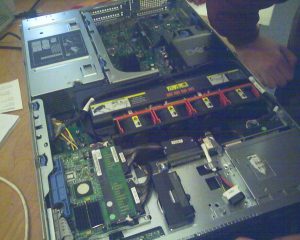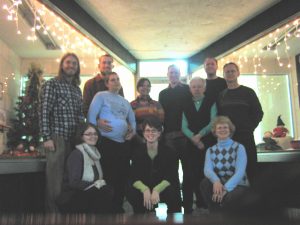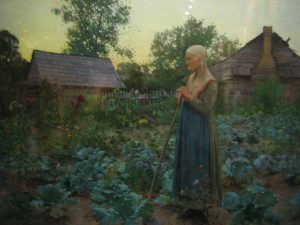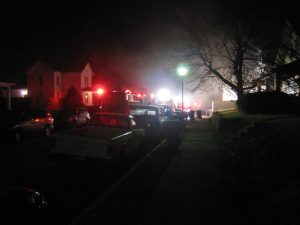 Perhaps one of my biggest concerns about working in the Internet industry and website development in particular is my participation in a cultural shift whereby people are now not only just able but clearly expected to look for and find online the information they need to live their lives. Where as it used to be the case that referring someone to your website was a way to complement information you were already giving them, or was just one method of contacting you, the display of a web address is now often the only way that many businesses and organizations make their products and services available. The unfortunate reality is that this is no longer confined to promoting the luxuries and accessories of an upper- or middle-class lifestyle, and it's part of a larger trend of an increasing dependence on highly complex infrastructure to perform basic tasks, fulfill basic human needs.
Perhaps one of my biggest concerns about working in the Internet industry and website development in particular is my participation in a cultural shift whereby people are now not only just able but clearly expected to look for and find online the information they need to live their lives. Where as it used to be the case that referring someone to your website was a way to complement information you were already giving them, or was just one method of contacting you, the display of a web address is now often the only way that many businesses and organizations make their products and services available. The unfortunate reality is that this is no longer confined to promoting the luxuries and accessories of an upper- or middle-class lifestyle, and it's part of a larger trend of an increasing dependence on highly complex infrastructure to perform basic tasks, fulfill basic human needs.
Continue reading "For More Information, Visit Us on the Web"
Tag: complexity
 As I was preparing to graduate from college, I had already decided that I would be staying in the same town (Richmond) for the foreseeable future, and so I was a spectator to the strange but customary phenomenon of having all of my friends from the past four years pack up and prepare to leave town. In many cases they were good friends - loved ones with whom I had experienced some of the most challenging and growing years of my life so far. They knew me, and I knew them, and we had found a rhythm together in that bubble of academia. In other cases, they were people who I hadn't really had time to fully know despite wanting to, and watched whatever sense of possibility that existed there fade away as they went. At the time I had a feeling in my gut that it just wasn't right, wasn't natural to spend so much time building community with others only to see it scattered to the wind of change blown forth by the fairly arbitrary milestone of graduation day.
As I was preparing to graduate from college, I had already decided that I would be staying in the same town (Richmond) for the foreseeable future, and so I was a spectator to the strange but customary phenomenon of having all of my friends from the past four years pack up and prepare to leave town. In many cases they were good friends - loved ones with whom I had experienced some of the most challenging and growing years of my life so far. They knew me, and I knew them, and we had found a rhythm together in that bubble of academia. In other cases, they were people who I hadn't really had time to fully know despite wanting to, and watched whatever sense of possibility that existed there fade away as they went. At the time I had a feeling in my gut that it just wasn't right, wasn't natural to spend so much time building community with others only to see it scattered to the wind of change blown forth by the fairly arbitrary milestone of graduation day.
Since them I've come to wonder with even more bewilderment why we so often leave the communities that love us. We spend so much of our lives trying to find our identities, trying to establish who we are in a given context, trying to find people we can connect to, bond with, lean on. Why do we then also seem to be able to so quickly give those things up because of a job change, a shift in our passions, a thought of journeying across the state, the region, the country, the world to find what we're looking for?
Continue reading "Why do we leave the communities that love us?"
 I thoroughly enjoyed this post by Dave Pollard: Need Less.
I thoroughly enjoyed this post by Dave Pollard: Need Less.
The essence of radical simplicity, of the gift/generosity economy, of natural community, and of natural entrepreneurship, I think, is needing less. Needing less makes us, as individuals, members of enterprises, communities and societies, more self-sufficient, and more resilient, and allows us to give more with the 'excess' time, energy and money that we have by virtue of needing less.
Dave goes on to list a few ways that needing less in everyday life might manifest itself. Perhaps obvious to some, overly abstract to others...a pleasant reminder for me.
 It's interesting to me that the phrase "for national security reasons," offered by the U.S. government and governments around the world to justify various uncomfortable activities (withholding information from or spying on its citizens, demanding cooperation from corporations in legal gray areas, etc.) is so commonly used and so consistently effective. It's effectiveness is based on an apparently safe assumption that the American people largely subscribe to at least one of two world-views: 1) The needs of the many outweigh the needs of the few, and 2) the government knows what's best for us as individual citizens better than we do ourselves.
It's interesting to me that the phrase "for national security reasons," offered by the U.S. government and governments around the world to justify various uncomfortable activities (withholding information from or spying on its citizens, demanding cooperation from corporations in legal gray areas, etc.) is so commonly used and so consistently effective. It's effectiveness is based on an apparently safe assumption that the American people largely subscribe to at least one of two world-views: 1) The needs of the many outweigh the needs of the few, and 2) the government knows what's best for us as individual citizens better than we do ourselves.
How do these world-views work in the government's favor?
I generally avoid national bestselling political books that are just consolidated accounts of the political soap operas that go on in our nation's capital, designed to make more buzz and more money for the journalists or whistle-blowers or former aides that happened to keep really good notes during the experience. But once in a while there are some pretty compelling publications that appear in that genre, and I can't help but dive in. Bob Woodward's Plan of Attack certainly emerges as an example of a page-turner for anyone interested in national politics, the executive branch's decision making process, and especially how the U.S. ended up invading Iraq.
Continue reading "Plan of Attack by Bob Woodward"
The editorial cartoon in today's Palladium-Item depicts a lone protester standing in front of an imagined future strip mall in Richmond, with an onlooker suggesting that the protester get on with his life. It's a poignant visualization of one of the destructive attitudes that plagues this town and many others like it: "what's done is done, no use in whining about it, move on and make the best you can." At first glance this might seem to be an admirable approach to use with the difficult issues we all encounter in life, but some Richmond residents and decision makers often apply it pre-emptively to matters where there are still complex choices to make, nuanced options to ponder, and opportunities to seek alternatives for the betterment of our community. The logic is circular: because something might be so, it must be so.
Continue reading "Appreciating Choices that Matter"
My friends Glen and Donna Lawrence have teamed up to help me to come to an important and tragic realization: that I'll never be able to get a job at the new Frisch's Big Boy planned for location here in Richmond. You know, the one I pledged never to visit. Worse, my FAMILY won't ever be able to work there! WHAT HAVE I DONE? I didn't realize that boycotts can work in reverse!? I have crippled my children and my children's children, and all those of the 319 other people (to date) who have made the same pledge! I had dreams!
(Sorry, I couldn't resist. Anticipating that there will be other similar responses, I promise not to blog about each one.)
The personal commitment I made late last week to boycott stores that might develop on the Hayes Arboretum land here in Richmond has gotten a bit of attention. The signatures of folks who share my commitment have been coming in steadily, with more than a hundred after just a few days. Bill Engle from the Palladium-Item called yesterday to interview me about the petition. He was friendly and understanding, but he seemed to have a hard time figuring out why I wasn't better fitting what I suspect was his profile of an "angry activist," which I'm not. Perhaps it would have been an easier story for him to write if I'd just chained myself to a tree? He did note that he was glad we weren't actually attacking the institution of Frisch's Big Boy itself...I take it he's a fan.
Continue reading "Follow up on Hayes pledge"
In June of 2003, the folks who manage the Hayes Arboretum here in Richmond announced their plans to sell 33 acres of the Arboretum that runs along the main National Road in Richmond for commercial development...another strip mall, ugh. It was recently announced that the first three tenants signed on to the planned development are Menard's, Walgreens, and Frisch's Big Boy. I usually avoid activism of this sort, but I've launched a petition, where the signatories have pledged not to spend money at these locations or any other retailers that might locate there. The full pledge is below; please consider signing if you agree.
Continue reading "A pledge to boycott stores located on Hayes land"
Saturday Night Live last night was fairly boring, and so I don't think you can blame me for falling asleep on the couch. But when the three-wick candle I was burning on the table started to trickle hot wax onto the table and then down onto the rug, you'd think my cat would have had the initiative to wake me up or at least try to put a towel or something around the candle. But, no, miss "no opposable thumbs" just went right on sleeping too. And so this morning when I came downstairs wondering if the exciting events from the night before had actually happened, my cloudy memories were confirmed by the big splotches of dried wax distributed unevenly around the rug. Argh.
Continue reading "What do we know without the Internet?"
